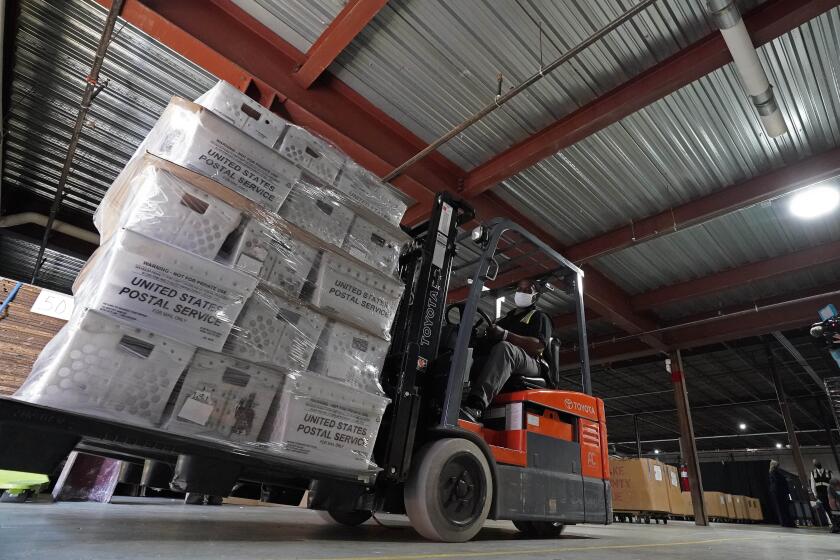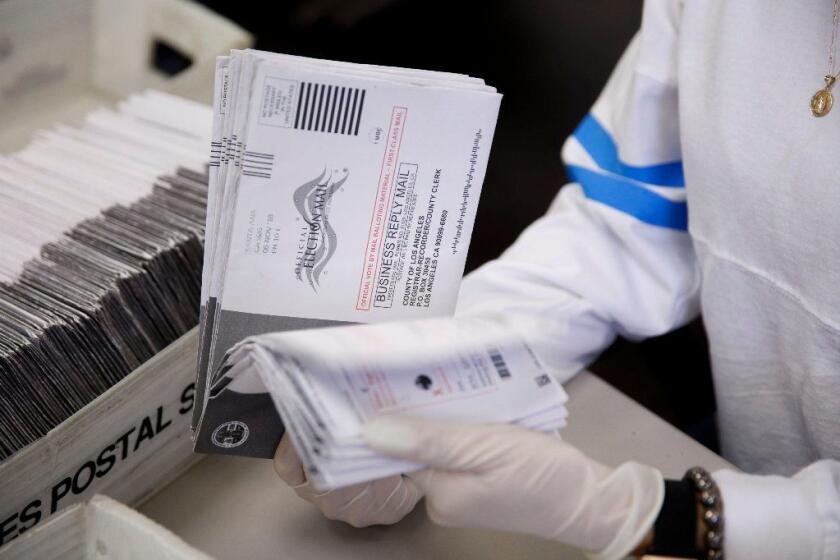GOP takes Pennsylvania courtâs ballot deadline to U.S. Supreme Court

HARRISBURG, Pa. â Republican lawmakers in Pennsylvania asked the U.S. Supreme Court on Monday to put a hold on a ruling in the presidential battleground state that extended the deadline in Novemberâs election to receive and count mailed-in ballots.
Republicans, including President Trumpâs campaign, have opposed such an extension, arguing that it violates federal law that sets election day as the first Tuesday in November and that such a decision constitutionally belongs to lawmakers, not the court.
Republicans also object to a portion of the state courtâs ruling that orders counties to count ballots that arrive during the three-day extension period even if they lack a postmark or legible postmark, unless there is proof they were mailed after polls closed.
âThis is an open invitation to voters to cast their ballots after Election Day, thereby injecting chaos and the potential for gamesmanship into what was an orderly and secure schedule of clear, bright-line deadlines,â lawyers for the Senateâs two top Republicans wrote.
The state Democratic Party and its allies had sought an extension of Pennsylvaniaâs election day deadline to count mailed ballots as their voters were requesting mail-in ballots at a nearly 3-to-1 ratio over Republicans.
In its Sept. 17 ruling, the divided state Supreme Court said ballots must be postmarked by the time polls closed and be received by county election boards at 5 p.m. on Nov. 6.
The court cited warnings about Postal Service delays in making huge numbers of ballots late and surging demand for mailed ballots during the coronavirus pandemic to invoke the power, used previously by the stateâs courts, to extend election deadlines during a disaster emergency.
These states will probably decide if Joe Biden or President Trump wins the election. And their absentee ballot laws could determine when we find out.
In another battleground state won narrowly by Trump in 2016, a federal appeals court on Sunday halted a lower courtâs order to extend counting mailed-in ballots in Wisconsin by six days after election day.
The halt is a victory for Republicans and Trump over Democrats and their allies seeking more time as a way to help deal with an expected historic high number of absentee ballots.
The filing with the nationâs highest court comes as Pennsylvania counties have begun sending out ballots to registered voters who asked to vote by mail.
It also came less than two days after Trump, who is behind in national polls, claimed the only way he could lose Pennsylvania was if Democrats cheated â part of his long-running effort to discredit voting by mail.
âTheyâre going to try to steal the election,â he said at a Saturday rally at Harrisburg International Airport. âThe only they way to win Pennsylvania frankly is to cheat on the ballots.â
COVID-19 has led to a push for vote by mail, but advocates face logistical and legal hurdles â and ârigged electionâ claims from President Trump.
Trump seized on an election error in northeastern Pennsylvania, where, according to a county official there, a temporary election worker mistakenly threw away nine mailed-in military ballots. There were no accusations of election fraud from authorities investigating it.
Federal investigators announced seven of the ballots were cast for Trump, raising questions about the Justice Departmentâs actions.
Gov. Tom Wolf, a Democrat, said Monday that his administration was still trying to find out how and why they ended up in the trash. He also pointed out that voting by mail had been going on in Pennsylvania for a long time â although a year-old law greatly expanded it â and he suggested that Trump was calling it fraudulent because he was losing.
âI certainly understand the idea of the side that appears to be losing would call foul on the process,â Wolf said. âBut the commonwealth is doing everything we can do make sure the elections are fair and every ballot is counted, just as we did back in the primary with this new system.â
More to Read
Get the L.A. Times Politics newsletter
Deeply reported insights into legislation, politics and policy from Sacramento, Washington and beyond. In your inbox three times per week.
You may occasionally receive promotional content from the Los Angeles Times.












